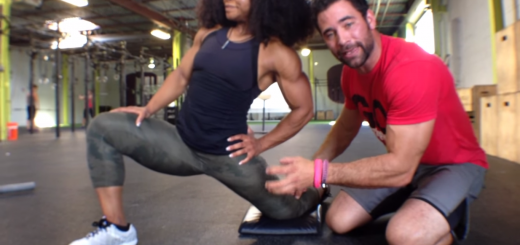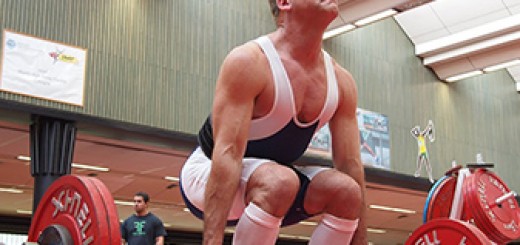What is YOUR Reason to CrossFit?
You hit your PR, sweat it out during every WOD – but why do you do it? Is it for weight-loss; to belong to a group of dedicated individuals from all walks of life; or is it for something more?
Maintaining Perspective on CrossFit
Athletes of all kinds recognize that mental preparation is as important as physical training. In Part 1[3] and Part 2[4] of this series, we looked at tangible ways to prepare for a workout – whether it be daily training or possibly a competition – and how to stay focused and positive during the WOD itself.
Ultimately, however, CrossFitters want to be good at life, not just good at being fit. In this last installment of our three-part series on mental training, several elite athletes share their wisdom on maintaining a healthy perspective on how handling physical challenges translates to pushing toward greater life goals.
Overcoming Doubt
Blair Morrison, 7th place finisher in the 2011 CrossFit Games, writes a regular “Fitness Is…” column in his blog Anywherefit[5]. In his essay “Fitness Is… Doubt[6],” he reflects that if we never face our fears – in life or in CrossFit – and try to push past them, then our ability to do so fades slowly over time:
In order to truly grow we must be willing to live on the margins and step outside our comfort zone, in many cases risking failure. We need to tap into the stores of courage and determination that most days lie collecting dust. If we don’t, they lose their potency.
He encourages people to push against the limitations they place on themselves:
Rather than silently dreading the day when double unders come up in a WOD, do so many of them that you’d just as soon skip rope across the street as you would walk there. Rather than telling yourself you’re too old to keep up with the fire-breathers, re-define your limits and stop making excuses. Refuse to be intimidated by your weaknesses and you might discover that all this time that you were drowning yourself in a 3-foot pool.
That “pool” is often comprised of negative self-talk from all parts of our lives. Acknowledge that it’s there, and replace it with positives and new goals.
On Mental Toughness
Even the best, most experienced athletes face the kind of doubt Blair Morrison describes. Sage Burgener, daughter of Olympic lifting coach Mike Burgener[7], writes of how hard it was to train for the CrossFit Games. How could she measure up to all of the elite athletes around her who seemed to dominate workouts effortlessly? She turned to her brother, Casey Burgener, who wrote her an inspiring letter[8] in response:
…You have to be comfortable with the possibility that you may succeed tremendously, or fail miserably (in terms of winning and losing). The important thing is that you committed, and you did everything you could to make it happen. Trust me, if you do that, the thoughts about winning and losing seem to almost disappear. It’s about overcoming yourself, and pushing yourself to become greater than you were the day before, that’s what really matters….
Mental toughness for me has always been hard to explain. I’ve never really thought that I was mentally tough, but the reason why I was successful in meets is because I KNEW what I was capable of. I can’t tell you how many times I’ve wanted to quit lifting, or give up, but I didn’t because I committed to what I was doing…When you commit to whatever it is in life, make sure it’s a positive direction, and just don’t quit. Fight with all of your being to achieve what you set out to, and know that you’re becoming a better person because of it. So even if you have a bad day, or hate CrossFit, or lifting, or school, or whatever it is, you can still have the confidence that what you’re doing is making you better in some way, and that is a beautiful feeling.
Aimee Anaya of Catalyst Athletics[9], echoes a similar sentiment[10]:
In short: Embrace the process, even when it challenges you the most.
The Big Picture
Noah Abbott, of CrossFit South Brooklyn[11], offers some excellent tips[12] on framing how CrossFit fits into your daily life, particularly as you gain experience and battle through plateaus in training:
1. Practice your weaknesses.
Embrace every exposure to them as an opportunity to practice perfectly and gather experience and insight about a difficult adversary…. Attend days when those weaknesses are programmed, or program them yourself during open gym days.
2. Spend time to consider what CrossFit means in your life and why you stick with it.
Aside from the infinitesimal percentage of elite, competitive CrossFit athletes, most of us come to the gym for reasons that all fall under the umbrella of “Improving Quality of Life.” Increasing work capacity, being able to participate in new and challenging activities, looking better naked — all of these are broad, life-oriented goals that we work towards every single time we come to the gym, whether it’s a day when we hit a PR or where we bail on every set.
3. Remember that your ability to CrossFit is a privilege in itself.
You have a life that allows you to spend a nice chunk of time each week picking up heavy stuff, running, jumping….Your worst day at the gym is better than a day sitting on the couch mainlining Pringles.
A Final Thought
As human beings, it is normal to have feelings of fear and doubt, to underestimate our own abilities. But instead of being paralyzed or tormented by those feelings, we have to nurture an attitude of positive thinking, one that celebrates effort as much as accomplishment. Strengthening one’s mental game as a CrossFit athlete can only have positive impact on all of the other aspects of life.
Original Article by: Kristy Parrish at TabataTimes





